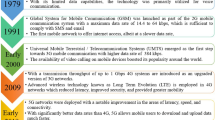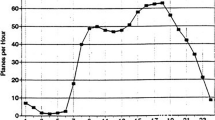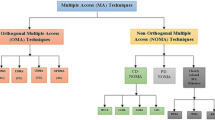Abstract
In this paper we focus on a class of polling systems encountered while modeling the ferry based wireless local area network (FWLAN). A moving ferry, while walking in a predetermined cyclic path, communicates with the static nodes (or users) of the network via a wireless link. The ferry is assumed to stop and communicate with a node that has a packet to send or to receive, when it is closest to that node. The location distribution of the node to which or from which a packet arrives is assumed to have a support of positive Lebesgue measure. These features imply that polling models with finite number of queues cannot be used to model the system. We study in this paper the continuous polling systems with service disciplines that model the use of the FWLAN (and that are more complex than the classical exhaustive or gated services). Our approach is based on discretization of the continuous polling model. We propose a special way of discretizing the continuous system such that: (1) the known Pseudo conservation laws can be applied to obtain the stationary expected workload of the discrete systems; (2) the limit, of these ‘discretized' expected workloads, equals the stationary expected workload of the continuous system. Our results rely heavily on fixed point analysis of infinite dimensional operators.
Similar content being viewed by others
References
Altman, E., & Levy, H. (1994). Queueing in space. Advances of Applied Probability, 26, 1095–1116.
Altman, E., Khamisy, A., & Yechiali, U. (1992). On elevator polling with globally gated regime. Queuing Systems, 11, 85–90 (special issue on “Polling Models'', Eds. H. Takagi and O. Boxma).
Altman, E., Konstantopoulos, P., & Liu, Z. (1992). Stability, monotonicity and invariant quantities in general polling systems. Queuing Systems, 11(1–2), 35–57.
Baccelli, F., & Brémaud, P. (1991). Applications of Mathematics: Vol. 26. Elements of queueing theory. Berlin: Springer.
Berger, M. S. (1977). Nonlinearity and functional analysis. New York: Academic Press.
Boona, M. A. A., van der Meib, R. D., & Winands, E. M. M. (2011). Applications of polling systems. Surveys in Operations Research and Management Science, 16(2), 67–82.
Boxma, O. (1989). Workloads and waiting times in single-server systems with multiple user classes. Queuing Systems, 5, 185–214.
Boxma, O. J., & Groenendijk, W. P. (1987). Pseudo-conservation laws in cyclic-service systems. Journal of Applied Probability, 24(4), 949–964.
Boxma, O.J., Levy, H., & Yechiali, U. (1992). Cyclic reservation schemes for efficient operation of multiple-queue single-server systems. Annals of Operations Research, 187–208.
Boxma, O. J., Bruin, J., & Fralix, B. (2008). Waiting times in polling systems with various service disciplines. EURANDOM report, June 2008.
Coffman, J. E. G., & Gilbert, E. (1986). A continuous polling system with constant service times. IEEE Transactions on Information Theory, 32, 584–591.
Coffman, J. E. G., & Gilbert, E. (1987). Polling and greedy servers on the line. Queueing Systems, 2115–2145.
Eliazar, I. (2003). The snowblower problem. Queueing Systems, 45, 357–380.
Eliazar, I. (2005). From polling to snowplowing. Queueing Systems, 51(1–2), 115–133.
Foss, S. G., & Chernova, N. I. (1996). Comparison theorems and ergodic properties of the polling systems. Problemy Peredači Informacii, 4, 46–71.
Fuhrmann, S., & Copper, R. (1985). Applications of the decomposition principle in m/g/1 vacation models to two continuum cyclic queueing models. AT&T Technical Journal, 64, 1091–1098.
Georgiadis, L., & Szpankowski, W. (1992). Stability of token passing ring. Queuing Systems, 11(1–2), 7–33.
Kavitha, V. (2011). Continuous polling with rerouting and applications to ferry assisted wireless LANs. ValueTools 2011.
Kavitha, V., & Altman, E. (2009). Queueing in space: design of message ferry routes in static adhoc networks. In 21st international teletraffic congress (ITC 21), Paris, France, 15–17 September 2009.
Kavitha, V., & Altman, E. (2010a). Analysis and design of message ferry routes in sensor networks using polling models. In WiOpt, Avignon, France, May 31–Jun 04.
Kavitha, V., & Altman, E. (2010b). Opportunistic scheduling of a message ferry in sensor networks. In MobiOpp 2010, Pisa, Italy, February.
Khamisy, A., Altman, E., & Sidi, M. (1992). Polling systems with synchronization constraints. Annals of Operations Research, 35, 231–267 (special issue on Stochastic Modeling of Telecommunication Systems, Eds. P. Nain and K. W. Ross).
Kroese, D., & Schmidt, V. (1992). A continuous polling system with general service times. The Annals of Applied Probability, 2(4), 906–927.
Kroese, D., & Schmidt, V. (1993). Queueing systems on the circle. ZOR. Zeitschrift Für Operations-Research, 37(3), 303–331.
Kroese, D., & Schmidt, V. (1994). Single-server queues with spatially distributed arrivals. Queueing Systems, 17, 317–345.
Kroese, D., & Schmidt, V. (1996). Light-traffic analysis for queues with spatially distributed arrivals. Mathematics of Operations Research, 21, 135–157.
Leskela, L., & Unger, F. (2010). Stability of a spatial polling system with greedy myopic service. Annals of Operations Research.
Robert, P. (2010). The evolution of a spatial stochastic network. Stochastic Processes and their Applications.
Rojas-Nandayapa, L., Foss, S., & Kroese, D. (2011). Stability and performance of greedy server systems: a review and open problems. Queueing Systems.
Saad, W., Han, Z., Basar, T., Debbah, M., & Hjorungnes, A. (2009). A selfish approach to coalition formation among unmanned air vehicles in wireless networks. Gamenets, Istanbul, Turkey.
Shi, Y., & Hou, Y. T. (2008). Theoretical results on base station movement problem for sensor network. In IEEE INFOCOM 08.
Sidi, M., Levy, H., & Fuhrmann, S. W. (1992). A queuing network with a single cyclically roving server. Queuing Systems (special issue on Polling Models, Eds. H. Takagi and O. Boxma) (pp. 121–144).
Takagi, H. (1986). Analysis of polling systems. Cambridge: The MIT Press.
Tariq, M. M. B., Ammar, M., & Zegura, E. (2006). Message ferry route design for sparse ad hoc networks with mobile nodes. In Proc. of ACM MobiHoc, Florence, Italy, 22–25 May 2006 (pp. 37–48).
Whitt, W. (1991). A review of l=λw and extensions. Queueing Systems: Theory and Applications, 9(3), 235–268.
Yousefi, S., Altman, E., El-Azouzi, R., & Fathy, M. (2007). Connectivity in vehicular ad hoc networks in presence of wireless mobile base-stations. In The proceedings of the 7th international conference on ITS telecommunications, Sophia-Antipolis, France, June 6–8.
Author information
Authors and Affiliations
Corresponding author
Additional information
This work was sponsored by The Indo-French Center for the Promotion of Advanced Research under CEFIPRA Project# 4000-IT-1.
Rights and permissions
About this article
Cite this article
Kavitha, V., Altman, E. Continuous polling models and application to ferry assisted WLAN. Ann Oper Res 198, 185–218 (2012). https://doi.org/10.1007/s10479-011-0960-x
Published:
Issue Date:
DOI: https://doi.org/10.1007/s10479-011-0960-x




